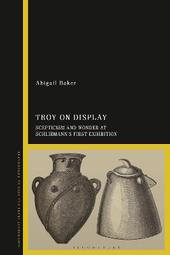
|
Troy on Display: Scepticism and Wonder at Schliemann's First Exhibition
Paperback / softback
Main Details
| Title |
Troy on Display: Scepticism and Wonder at Schliemann's First Exhibition
|
| Authors and Contributors |
By (author) Dr Abigail Baker
|
| Physical Properties |
| Format:Paperback / softback | | Pages:280 | | Dimensions(mm): Height 234,Width 156 |
|
| Category/Genre | Ancient and classical art BCE to c 500 CE
Exhibition catalogues and specific collections
Archaeology |
|---|
| ISBN/Barcode |
9781350191365
|
| Classifications | Dewey:939.21 |
|---|
| Audience | | Tertiary Education (US: College) | |
|---|
|
Publishing Details |
| Publisher |
Bloomsbury Publishing PLC
|
| Imprint |
Bloomsbury Academic
|
| Publication Date |
22 April 2021 |
| Publication Country |
United Kingdom
|
Description
This book explores what visitors saw at the Trojan exhibition and why its contents, including treasure, plain pottery and human remains captured imaginations and divided opinions. When Schliemann's Trojan collection was first exhibited in 1877, no-one had seen anything like it. Schliemann claimed these objects had been owned by participants in the Trojan War and that they were tangible evidence that Homer's epics were true. Yet, these objects did not reflect the heroic past imagined by Victorians, and a fierce controversy broke out about the collection's value and significance. Schliemann invited Londoners to see the very unclassical objects on display as the roots of classical culture. Artists, poets, historians, race theorists, bankers and humourists took up this challenge, but their conclusions were not always to Schliemann's liking. Troy's appeal lay in its materiality: visitors could apply analytical techniques (from aesthetic appreciation to skull-measuring) to the collection and draw their own conclusions. This book argues for a deep examination of museum exhibitions as a constructed spatial experience, which can transform how the past is seen. This new angle on a famous archaeological discovery shows the museum as a site of controversy, where hard evidence and wild imagination came together to form a lasting image of Troy.
Author Biography
Abigail Baker is Assistant Keeper of Archaeology at the Great North Museum, Hancock, UK. Her research focuses on the reception of classical archaeology in museums, both past and present.
ReviewsThe study explores the wide-ranging impact of the exhibition on various aspects of 19th-century thought, "bringing together a range of receptions [to build] a composite picture of the exhibition" (p. 32). Baker's multifaceted approach touches on the specific ways that the Trojan exhibition impacted contemporary receptions, from fashion to monetary policy, but also relates Troy itself to larger cultural debates on ancient chronology and racial theory ... Summing Up: Highly recommended. Lower-division undergraduates through faculty. * CHOICE * This handy little book, which can be read in one sitting, is a gold-mine of fascinating information. It also sets any reader (this reviewer included) thinking about the wider questions. * Classics for All * Baker's volume convincingly achieves its goal of demonstrating how much can be gained from considering temporary exhibitions and is to be commended for its accessible, engaging style ... A useful contribution to scholarship on Schliemann and a highly enjoyable read. * The Classical Review * This handsomely produced, generously illustrated book expands the final chapter of Abigail Baker's PhD thesis into 14 chapters, appraising the sociocultural environment of the first museum display of Schliemann's finds from Troy and that exhibition's effects on subsequent attitudes to prehistoric archaeology. * Bryn Mawr Classical Review * Dr. Baker shows us the care with which Schliemann staged his exhibit, revealing a clear and calculating intent on his part to persuade the viewers that his views on Troy were the correct ones ... [She] has successfully shown us that 'Troy with its untrustworthy excavator, archaeological complexity and combination of truth and fiction is an unusually fruitful site for thinking about what fascinates us about the past and questioning the methods we use to understand it' ( 16). * CJ-Online *
|